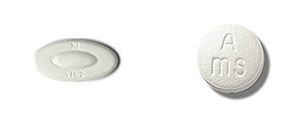Home › Treatment › Medications › Outpatient
Diuretics
Diuretics, also known as water pills, help eliminate excess fluids from the body. They cause the kidneys to make more urine and increase the body’s excretion of sodium, chloride, and potassium. Since the use of most diuretics can cause potassium levels in the body to be depleted be sure to include foods high in potassium in your diet. Diuretics are used to relieve both pulmonary and peripheral edema. In addition, they may be used to treat hypertension since they dilate blood vessels. Potential Side effects: dizziness, severe leg cramps, high blood sugar levels, high cholesterol levels Examples: (shown below, left to right) Furosemide (Lasix), Bumetanide (Bumex), Hydrochlorthiazide (HCTZ) 
ACE Inhibitors
Angiotensin Converting Enzyme (ACE) Inhibitors block the formation of Angiotensin II, a substance that causes constriction of blood vessels. In this way, ACE inhibitors reduce the strain on the heart. They relax smaller arteries and lower blood pressure. For this reason they can cause dizziness. Finally, ACE inhibitors can prevent undesirable increases in heart size. Potential Side effects: cough, dizziness, worsening of some types of kidney disease Examples: (shown below, left to right) Lisinopril (Prinivil), Enalapril (Vasotec), Captopril (Capoten)
Vasodilators
This group of drugs relaxes blood vessels and lowers the resistance against which the heart has to pump. Like ACE inhibitors or ARBs (Angiotensin II Receptor Blockers) they can cause low blood pressure and dizziness. Potential Side effects: low blood pressure (hypotension), dizziness, abnormally high heart rate (tachycardia), headache Examples: Hydralazine, Isosorbide Dinitrate, Nitroglycerin
Beta Blockers
These drugs block the heart cell response to catecholamines (norepinephrine, epinephrine) – compounds that cause the heart to work harder, increase blood pressure, and increase blood flow to muscles. Catecholamines are responsible for the “fight or flight” response of the central nervous system. Beta-Blockers may reduce the energy needs of the heart and when tolerated over a long time may actually reduce heart size and improve the function of the heart. Potential Side Effects: decreased ventricular function, slow heart rate, worsening of symptoms due to asthma Examples shown below: Carvedilol (Coreg, Left), Metoprolol (Toprol XL, Right)
Angiotensin II Receptor Blockers (ARBs)
ARBs are generally used as an alternate therapy to ACE inhibitors when ACE inhibitors cause side effects (for example, coughing). While ACE inhibitors block the production of Angiotensin II, these drugs serve as a blockade to Angiotensin II receptors, preventing it from constricting blood vessels. Potential Side Effects: fatigue, abdominal pain, edema, headache, dizziness Examples: Valsartan (Diovan, Left), Candesartan (Atacand, Right) 
Digitalis
Digitalis increases the strength of the heart’s contractions as well as reducing resistance in the blood vessels of the body. It also decreases heart rate in heart failure patients and may decrease edema. Potential Side effects: nausea and slow or fast heart beating Examples: Digoxin (Lanoxin)
Anticoagulants
Anticoagulants prevent blood clots from forming in the heart chambers, veins, or arteries. In small arteries such as the coronary arteries, anticoagulants may prevent clots from forming. Blood clots in these arteries could lead to a myocardial infarction or heart attack. Potential Side Effects: bleeding Examples: Coumadin (shown below), Aspirin, Plavix
Cholesterol Lowering Medications
A high level of cholesterol increases the chance of having a heart attack or stroke due to plaque buildup in arteries. Although cholesterol can be lowered mostly through exercise and proper diet, there are medications available for further assistance on cholesterol level lowering. Potential Side Effects: abnormal function of liver, muscle aches
Aldosterone Blockers
Aldosterone is a hormone released by the adrenal glands in response to a decrease in blood flow to the kidneys and other factors in heart failure, it is over produced and may contribute tofibrosis in the heart. Blockade of aldosterone effects may improve outcomes in more advanced heart failure. Potential Side effects: fatigue, headache, low blood pressure, nausea Examples: Spironolactone (Aldactone, shown below), Epelerenone
Entresto (valsartan/sacubitril)
Entresto contains 2 medications in a single pill and takes the place of an angiotensin converting enzyme (ACE) inhibitor. The first is a standard heart failure medication that blocks the actions of the vasoconstriction hormone angiotensin II (valsartan). The second is a new type of heart failure medication (sacubitril) that works by blocking the breakdown of hormones that help heart failure such as B type natriuretic peptide. This leads to both a further vasodilating effect and increase in water and sodium elimination by the kidneys. This medication can reduce the need for a heart failure patient to be hospitalized for heart failure or experience cardiovascular death. Potential side effects: cough, dizziness, hypotension, impaired renal function, and hyperkalemia. Should not be taken with an ACE inhibitor.


 Español
Español

















